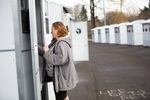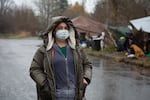
Vancouver's "Safe Stay Community" officially opened Dec. 23. Tenants said they were excited to leave their tents and hopeful for more stability in the city-sanctioned site.
Troy Brynelson / OPB
Less than a year after its launch, Vancouver officials are expressing optimism about the city’s newest approach to helping unhoused people, and hope to see more of it in the future.
A report card released Monday shows Vancouver’s first “Safe Stay Community,” which provides shed-like housing units and around-the-clock case managers, housed 14 of its 46 residents, a roughly 30% rate, in its first six months.
“It tells me that people do want housing,” said Jamie Spinelli, Vancouver’s homeless resources coordinator who helped spearhead the effort. “There is a kind of stereotype that people who are living outside don’t want to live inside, they don’t want to follow rules, et cetera.”
The community likewise helped its residents tap into other services. Eleven people have found jobs, Spinelli said, 13 people met with evaluators for substance abuse disorders.
Spinelli added that 911 calls to the North Image neighborhood cul de sac, which was a site of illegal camping for several people prior to the community, are also down 30%. Many people who lived at that site were the community’s first tenants.
“People who are experiencing homelessness get the cops called on them very regularly, not always for actual criminal activity,” Spinelli said. “Sometimes it’s just the existence of a tent in public space.”
While the sample size is small, Spinelli acknowledged, the numbers are heartening, especially in light of the public investment. Vancouver spent about $160,000 on the shelters alone, around $7,900 per unit, and paid nonprofit Outsiders Inn a one-year, $571,148 contract to staff case managers on the site.

Debbie Maddox stands in the doorway of one of 20 shelters Vancouver opened on Dec. 23. The outdoor shelter is Vancouver's first of three planned.
Troy Brynelson / OPB
Vancouver already launched a second site in April. Spinelli said city staff is still looking for a site for a third location.
And Spinelli told OPB on Tuesday she is asking for funding for another two sites. If the budget request is OK’d by the city council, Vancouver would then be on track for 100 total units across five communities.
“As long as we continue to operate the way we have been, just in the first six months, I’d be thrilled,” Spinelli said. “As would people who are currently living outside who would move in.”
Vancouver has so far been buying its shelters from Pallet Shelter, an Everett, Washington-based company that has grown significantly as the COVID-19 pandemic pumped up demand for emergency shelter for unhoused persons.
The so-called “non-congregate” model of shelter is on the rise nationally, experts say. The model, as opposed to the open-floor “congregate” model with rows of cots and bunkbeds sometimes seen in shelters, offers more privacy and a greater sense of security over a person’s belongings.
Steve Berg, of the National Alliance to End Homelessness, said communities are smart to lean into a new model if it is working for them, but also said communities should continue offering a range of shelter choices.
“Everybody’s different and everybody who is homeless is different,” Berg said. “That being said, if one kind of approach really proves to be more cost-effective at getting people out of homelessness ... then I think that’s going to lead to further investment in that kind of model.”
One likely factor in Vancouver’s success comes from case management, experts said. Social workers are tasked with helping people, which sometimes means holding them accountable without alienating them from the program.

Jamie Spinelli stands at a homeless camp in Clark County. Spinelli, Vancouver's homeless resources manager, said hotel vouchers for unsheltered people became more widely available last year during the pandemic.
Troy Brynelson / OPB
Spinelli and residents at Vancouver’s “Safe Stay Community” heaped praise on Outsiders Inn on Tuesday. The Vancouver nonprofit is founded by, and largely staffed by, people who have experienced homelessness.
“Having people with lived experience is really, really important to understand what people are going through,” said Gregg Colburn, a University of Washington professor and a housing policy analyst. “A quality service provider can have a huge impact on people.”
One “Safe Stay” resident underlined that sentiment Tuesday. Anthony, a 31-year-old who declined to give his last name, grew up in the Midwest and had been homeless since he was 14.
He now works as a janitor at a nearby YMCA. He said it’s his first job. He credited the “Safe Stay” staff.
“They never gave up on me,” said Anthony, who had struggled with methamphetamine. “There would be times when I’d slip. I’d be gone for a couple days. And they’d be like ‘What’s going on Anthony? Talk.’ And it’d be great.”
Anthony said the Stay Safe village helped him face his fears and focus on his future.
“I got to do what I got to do now, because I do not want to be back out there again,” he said. “I do not want to be back out there again.”


